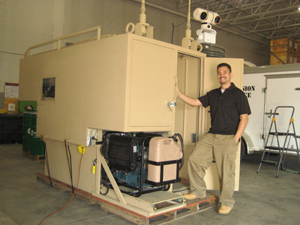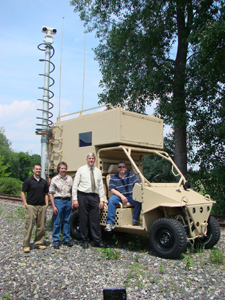C4 Module
Based on our experience integrating emerging
technologies throughout the SmarTruck prototype program
and on the heels of the first few LASSO utility vehicle
prototypes, ICRC was approached by our customer at Army
Research Lab (ARL) to design a Command, Control,
Communications, and Computers (C4) module for the US
Special Operations Command (US SOCOM) user community.
The C4 Module was designed to provide an enhanced
intelligence capability to LASSO users that are in need
of a mobile center for satellite communications,
unmanned aerial vehicle (UAV) surveillance, or
in-theatre covert operations.
I was brought on to manage the design and build portions
of the program. The design phase began with a visit to
meet with representatives from US SOCOM in order to
understand their unique requirements. This initial
meeting was followed up with a visit to see a UAV
command and control training exercise to better
understand what type of environment and operations might
be required by the resulting C4 module.
Apart from the typical remote power and climate control
systems that would be required to support the operator
and onboard systems, we soon understood that this user
community would require the use of different support
electronics to address each required mission. To be
useful to the Special Operations soldier, it became
clear that the C4 Module needed to be a user
configurable electronics support structure. To
accomplish this, accessible cable trays for easy wiring
and industry standard 19Ē equipment racks, which
included a system of hinged access doors, were created
for easy installation and removal of the electronics
that were mounted in the racks. Power was provided by a
5kW diesel generator that was also configured to support
loads of 110VAC, 12VDC and 24VDC. The C4 module would
have to support a military-ready satellite
communications solution and onboard military radio
communications. It was also fitted with a collapsible
pneumatic mast capable of lifting a number of different
payloads (antenna arrays, surveillance cameras, area
lighting systems) into the sky. It also needed to be
able to interface to number of different video feeds and
control units that military operators use to control
their UAVís.
I began by writing a high level design document and then
performed the necessary equipment technical assessments
which allowed me to specify the technologies that would
be integrated into the final design. I then
subcontracted the services of a military shelter
manufacturer in Fairbanks, Alaska to perform the shelter
design and worked with them to incorporate all the
necessary support systems. The shelter was built by RCO
Engineering in Warren, MI, who built the lightweight,
carbon fiber skinned, aluminum frame module in just over
four months. The completed module was delivered to ARL
for field testing as a UAV command post.


